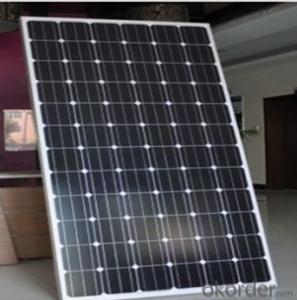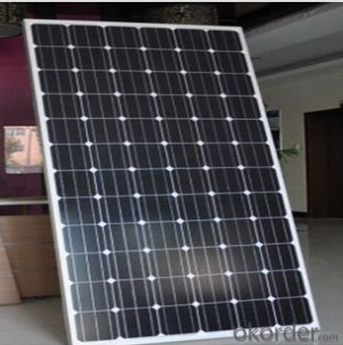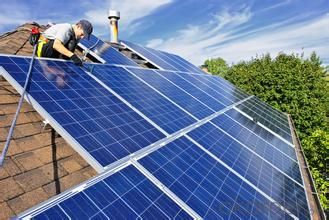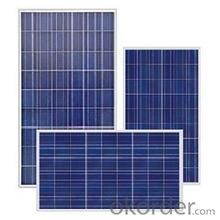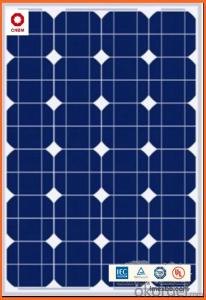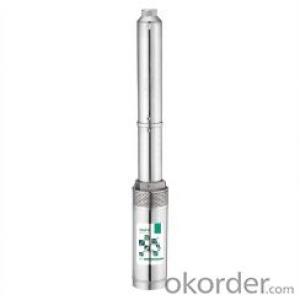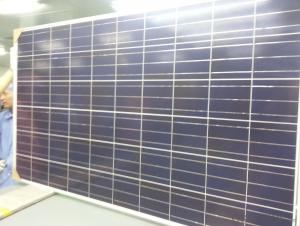Cheap Solar Energy Systems:45kw Solar Home Solution Approved by TUV UL CE
- Loading Port:
- Shanghai
- Payment Terms:
- TT OR LC
- Min Order Qty:
- 1 pc
- Supply Capability:
- 100 pc/month
OKorder Service Pledge
OKorder Financial Service
You Might Also Like
Specification
45KW Solar Home Solution Approved by TUV UL CE
Production description
PV array:
Convert sunlight instantly into DC electric power. Formed by the solar modules (also called photovoltaic
modules) in accordance with the system requirements for series and parallel.
Solar charge controller:
A charge controller may be used to power DC equipment with solar panels. The charge controller
provides a regulated DC output and stores excess energy in a battery as well as monitoring the battery
voltage to prevent over charge or over discharge. An inverter can be connected to the output of a charge
controller to drive AC loads.
Inverter:
Converts DC output power of photovaltaic soalr panels into standard AC power for use in the local off-grid
electrical network. It is a critical component in a photovoltaic system, allowing the use of ordinary
commercial appliances.
Battery banks:
Stores energy when there is an excess coming in and distribute it back out when there is a demand. Solar
PV panels continue to re-charge batteries each day to maintain battery charge.
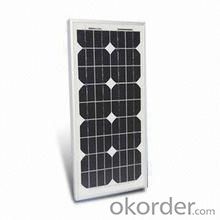
Feature
1.High conversion efficiencies resulting in superior power output performance.
2.Outstanding power output even in low light or high temperature conditions
3.Optimized design for ease of soldering and lamination
4.Long-term stability,reliability and performance
5.Low breakage rate
6.Color uniformaity
Physical characteristic
1. Rigorous quality control meets the highest international standards.
2. High-transmissivity low-iron tempered glass, strong aluminium frame.
3. Using UV-resistant silicon.
4. IS09001/14001/CE/TUV/UL
- Q: Can a solar energy system be installed in areas with high winds?
- Yes, a solar energy system can be installed in areas with high winds. However, it is important to ensure that the system is properly designed and installed to withstand the wind conditions of the specific area. This may involve using strong and durable mounting systems, reinforced frames, and secure anchoring methods to ensure the panels and components remain stable during high wind events.
- Q: Can a solar energy system be installed on commercial buildings?
- Solar energy systems can indeed be installed on commercial buildings, with many already adopting this sustainable method of generating electricity. Commercial buildings offer ample rooftop space or open land areas where solar panels can be installed. These panels can be seamlessly incorporated into the building's design or mounted on the rooftop, effectively harnessing sunlight and converting it into usable energy. The installation of a solar energy system on a commercial building brings numerous benefits. Firstly, it significantly reduces energy costs, as solar energy is both renewable and cost-free. Secondly, it serves as a clean and eco-friendly alternative to traditional energy sources, effectively reducing the building's carbon footprint. Moreover, commercial buildings with solar panels can take advantage of various government incentives and tax credits that encourage the use of renewable energy. Ultimately, the installation of a solar energy system on commercial buildings is not only feasible but also financially and environmentally advantageous.
- Q: Can solar energy systems be used in powering outdoor signage or billboards?
- Indeed, outdoor signage or billboards can be powered by solar energy systems. By placing solar panels on the roof or nearby structures, sunlight can be captured and transformed into electricity. This generated electricity is then employed to illuminate the lights or operate the digital displays of the signage or billboards, enabling them to function autonomously without relying on the conventional power grid. Given their prevalence in sun-drenched areas, solar energy systems are especially well-suited for outdoor signage. Moreover, utilizing solar energy aids in mitigating the carbon footprint linked to traditional methods of electricity production, rendering it an eco-friendly alternative.
- Q: Can solar energy systems be used in powering mining operations?
- Solar energy systems have the ability to power mining operations. This clean and sustainable source of power can generate electricity, benefiting mining operations in various ways. To begin with, mining buildings or nearby land can be equipped with solar panels to capture sunlight and convert it into usable electricity. This electricity can then be utilized to power different aspects of the mining site, such as lighting, ventilation systems, and machinery. By embracing solar energy, mining companies can decrease their reliance on fossil fuels and reduce their carbon footprint. Furthermore, solar energy systems can be combined with energy storage solutions, like batteries, to ensure a continuous power supply even when the sun is not shining. This guarantees that mining operations have a dependable source of electricity throughout the day and night, eliminating the need for backup generators or reliance solely on the grid. In addition, solar energy systems can be particularly advantageous for remote mining sites that are far from the electrical grid. In such cases, installing solar panels and battery storage systems can provide a cost-effective and sustainable solution for powering mining operations, avoiding the need for lengthy transmission lines or expensive diesel generators. In conclusion, solar energy systems have the potential to effectively power mining operations. They offer a renewable and sustainable source of electricity, reduce dependence on fossil fuels, and can be combined with energy storage for uninterrupted power supply. By embracing solar energy, mining companies can not only reduce their environmental impact but also enhance their long-term sustainability and operational efficiency.
- Q: Can a solar energy system be used to power electric vehicles?
- Yes, a solar energy system can be used to power electric vehicles. Solar panels can generate electricity that can be stored in batteries and used to charge the batteries of electric vehicles. This can provide a sustainable and renewable source of energy for powering electric vehicles.
- Q: Can solar energy systems be used for powering off-grid eco-farms?
- Yes, solar energy systems can be effectively used for powering off-grid eco-farms. Solar panels can be installed on eco-farm buildings or in open areas to harness the sun's energy and convert it into electricity. This clean and renewable source of energy can then power various aspects of the eco-farm, including irrigation systems, lighting, heating, cooling, and other electrical needs. By utilizing solar power, these off-grid eco-farms can reduce their reliance on non-renewable energy sources and minimize their carbon footprint, contributing to a more sustainable and environmentally friendly farming operation.
- Q: Are there any limitations to installing a solar energy system in a homeowner's association?
- There are potential limitations to installing a solar energy system in a homeowner's association (HOA). Although some HOAs have embraced renewable energy and implemented guidelines to facilitate solar installations, others may have restrictions or limitations. One possible limitation is the HOA's adherence to specific aesthetic guidelines or architectural standards. This means that the solar panels must be installed in a manner that aligns with the overall design and appearance of the community. In certain instances, this could result in limitations on the panels' size, location, or visibility. Another limitation is the impact on property values. While solar energy systems are generally viewed as a desirable feature, certain homeowners may have concerns regarding their effect on property values. Consequently, the HOA may require an approval process, including a review conducted by a committee or board, before permitting installation. Furthermore, limitations may exist related to the structural integrity of the property. The weight of solar panels can be substantial, and certain roofs or structures may not be able to handle the additional load. To ensure that the installation will not compromise the building's integrity, the HOA may demand a structural assessment or engineering report. Lastly, limitations may arise from legal and regulatory requirements. Depending on the jurisdiction, specific permits, licenses, or agreements may be necessary for solar installations. The HOA may be responsible for obtaining all required documentation and approvals, which can complicate and prolong the installation process. In summary, it is essential for homeowners to carefully review their specific HOA guidelines and engage in open communication with the association in order to understand any limitations or requirements that may be in effect.
- Q: Can solar energy systems be installed on ground-mounted structures?
- Yes, solar energy systems can be installed on ground-mounted structures. Ground-mounted solar panels are a popular option for residential, commercial, and utility-scale solar installations. These systems are typically installed on poles or racks mounted on the ground, allowing for flexibility in placement and orientation to maximize sunlight exposure. Ground-mounted structures can be an ideal choice in areas with limited roof space or shaded rooftops, providing a cost-effective and efficient way to generate solar energy.
- Q: Can solar energy systems be used for powering electric vehicles charging stations?
- Yes, solar energy systems can be used to power electric vehicle charging stations. Solar panels can be installed on the roof or nearby areas of the charging station to convert sunlight into electricity, which can then be used to charge electric vehicles. This allows for a sustainable and renewable energy source to be utilized for powering electric vehicles, reducing dependence on fossil fuels and lowering carbon emissions.
- Q: Can solar energy systems be used for powering remote communication towers?
- Yes, solar energy systems can be used for powering remote communication towers. Solar panels can generate electricity from sunlight, which can then be stored in batteries for use during times when sunlight is not available. This makes solar energy a reliable and sustainable option for powering remote communication towers, especially in areas where grid electricity is unavailable or unreliable.
Send your message to us
Cheap Solar Energy Systems:45kw Solar Home Solution Approved by TUV UL CE
- Loading Port:
- Shanghai
- Payment Terms:
- TT OR LC
- Min Order Qty:
- 1 pc
- Supply Capability:
- 100 pc/month
OKorder Service Pledge
OKorder Financial Service
Similar products
Hot products
Hot Searches
Related keywords
